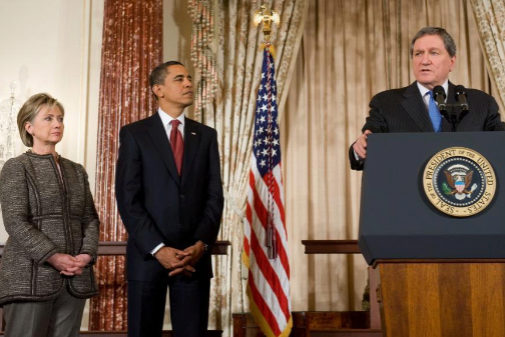Six years ago, when George Packer published The Crumbling (Debate), the journalist - then in the New Yorker and now in The Atlantic - drew in a report an immense fresco (for his critics, endless) of real characters that foreshadowed the United States of Donald Trump.
Now he has turned the tortilla with Our Man : an exhaustive biography of Richard Holbrooke , the architect of the US foreign policy for much of the presidency of Bill Clinton and the first term of Barack Obama, that Debate plans to publish this fall.
Thus, in six years, George Packer has gone from describing the trumpism troop class long before the trumpism existed, to recounting what the elite against whom trumpism rose.
When the two books are compared, it is impossible to avoid thinking that Our Man is the reverse of The Crumbling. And so the author acknowledges. «In Our Man you see the people who make in the institutions the decisions that affect the people of The collapse . But, as Holbrooke operates in foreign policy, its decisions are more about the role of the United States in the world, than about political or social day-to-day life, ”Packer explains to EL MUNDO after presenting his new book at the Washington headquarters. from the German Marshall Fund, a think tank that itself summarizes all that Holbrooke meant and, also, everything that triggers Trump's anti-globalist rhetoric: a center for foreign policy studies aimed at strengthening US-European cooperation, founded with money from the Marshall Plan, with which Washington revitalized the European economy after World War II, and in which, above, Emmanuel Macron was a fellow.
The journalist, who won the National Book Prize in the US in the category of Nonfiction with The Crumbling , does not deny that the combination of the two books explains much of what is happening in his country, because «the average American is not included in those decisions, he does not feel respected when these decisions are explained to him, and he feels he pays the price of those decisions. But those who do not pay the price are those who make the decisions, like Holbrooke ». Let no one expect Packer to defend, however, anti-elitism. "This is how people have lost faith in the elites, have displaced those elites, and have chosen a jester instead ," he concludes, in an obvious reference to Donald Trump.
It could be argued that, if someone is part of the elite, it is Packer himself. He is grandson and nephew of congressmen; son of two relevant professors at Stamford University, unquestionably one of the best in the world; and has been the star of the two most aggressively well written and arrogant magazines in the US, the New Yorker and the Atlantic .
But Packer is hard on his own. As he explains, “Holbrooke was the best of the elite. I made the best decisions. But he was also part of the elite and did not care much for the rest of the country. He directed foreign policy while dealing with his own affairs, earning money between public work and public work, taking shortcuts here and there, and getting mortgages at very low interest rates for his houses, and all without having to give explanations to anyone. So, at the end of his life, although he didn't know it, it was time to settle the accounts.
Packer says he sympathizes more with the characters in The Crumbling than with Our Man characters . «I prefer to spend time with people like Tammy Thomas [a daughter of a drug addict who is one of the main protagonists of her previous book] because I learn more from them. Talking to famous people sometimes doesn't help, because they know how to dodge the questions, and you never get to the truth, ”he explains, and rivets with a condemnatory phrase: “ The memories of great men are often dishonest and boring, because they don't tell you that what made them great is nothing other than ambition, because that doesn't fit well . Packer's approach is the same, be enlightened to those who appear to God in dreams that diplomats using wars to promote their career: "Listen to the people."
The problem is what to do when listening to someone who plays with words. There, Packer reveals a psychological secret that served as an author: transferring his cynical, pragmatic and brilliant biography from the world of reality to that of fiction . Or, as he says, “What made this book interesting to write was to transform this famous and powerful man into a novel character. Although in Our Man I don't tell anything that hasn't happened, I focused on Holbrooke as a character in a novel ».
In fact, George Packer admits that he would never have been able to write his new book if the great architect of the US foreign policy in the Balkans, at the UN and in Afghanistan had not died of a fulminating heart attack on December 13, 2010. Already Almost nine years. "That Richard Holbrooke was dead was the inexcusable condition for other people to talk about him." So, at least when it comes to great characters in History, "the hero has to be dead, because, if he is alive, everyone expects something from him . " When elites are alive, better not to touch them.
According to the criteria of The Trust Project
Know more- Politics
- Donald Trump
- U.S
- Barack Obama
- Emmanuel Macron
United States Progressive Squad Rebellion Against Democratic Leader Nancy Pelosi
Macroeconomics The fall of the pound shakes Johnson's hard Brexit
EconomyParis defends its Google rate despite Trump's threats to respond with French wine tariffs

